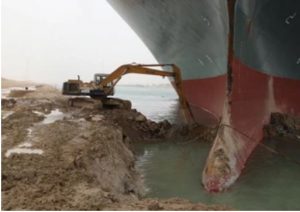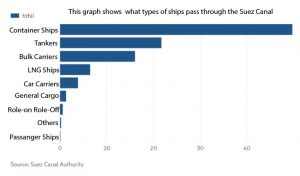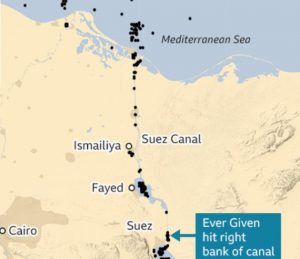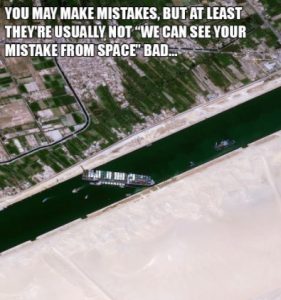On March 23 of this year, a 40-mile per hour desert wind blew the Japanese-owned Ever Given cargo ship to wedge 30 degrees into the side of the world’s most vital maritime commerce artery, the Suez Canal.
Shortly after, global eyes watched release efforts to free the lodged ship and allow over 400 other cargo to continue their journey.

Egyptian tug boats spearheaded the initial effort to release the boat from the shallow waters, but as progress slowed, excavators dug up surrounding dirt to speed up the process.
A Brief History of the Importance of the Suez Canal
The Suez Canal is objectively the world’s most important seafaring passage. It provides a passage for more than 4 times the amount of traffic than its closest competitor, the Panama Canal. The Suez Canal alone accounts for 12% of total global trade. Any major blockage of the waterway would result in a trading halt, especially in the globalized import and export world.
But it’s happened before. In 1956, the Suez Crisis sparked between Egypt, Britain, and France. With Arab oil rebuilding post-WWII nations, France and Britain maintained control of the canal to secure profitable deals for themselves. Egypt wanted a larger share of the profits from the canal and thus forcefully closed it until 1957. In response, the two European powers invaded Egypt but received criticism from other world powers calling for them to back out. France and Britain acknowledged the global frown and withdrew. Tampering with the corridor would prove to not be just a measly three-state conflict, but a world-shaking event as it completely halted trade for the duration of the conflict.
The Damage Done
As more and more boats on either side of the Ever Given began to pile up, so did operation expenses.

At its worst, nearly 10 billion dollars a day was drained from shipping agencies and ports due to idling ships and uncompleted arrival deadlines. Peter Berdowski, CEO of the sister company to the one who led the excavation effort, claimed freeing the ship could take “days to weeks.” With many other experts suggesting the same thing, numerous shipping companies decided to reroute cargo the old-fashioned way: alongside the African coast, and around Cape Town, South Africa. After rounding the tip of Africa, many headed to Europe’s vital Rotterdam Port in the Netherlands.
According to Business Insider, this detour added at most 15,000 nautical miles to a trip, thus increasing a company’s cost of ship fuel and crew accommodations. As well, the looming danger of piracy off the Somali coast added to the list of drawbacks many companies felt they had to take.
Afloat Once Again
Six-day later, on March 29, excavation and tug boats set the boat free.
The Egyptian government ordered an over 1 billion dollar fine to Ever Given’s owning company, Imabari Shipbuilding. The company has refused to pay as of this publishing date. In response, Egypt impounded the ship in its Great Bitter Lake.
The Aftermath
The next problem at hand was the traffic jam of ships on each side of the Ever Given. The Egyptian government ordered all ships with livestock to enter and exit first because of limited animal feed, while others had to wait. Weeks later, traffic mirrored what it had hours before the bad weather.
The obstruction didn’t drastically affect average American consumers or global industry.
Mark Zandi, a chief economist predicted: “pennies on the barrel” in regards to crude oil cost. Predictably, Arab crude oil prices slightly decreased while U.S. crude oil prices slightly rose.
Europe, which relies much more heavily on Arab oil, did see more pricey gasoline prices.

There was one good result out of the mishap – comedy. Social media of all sorts filled with satire or teasing regarding the oddity of jamming a 194-foot wide boat in a nearly 1,000-foot wide canal.
Sources: BBC, CNN, Business Insider, TradeWinds, Deutsche Welle News, USA Today
